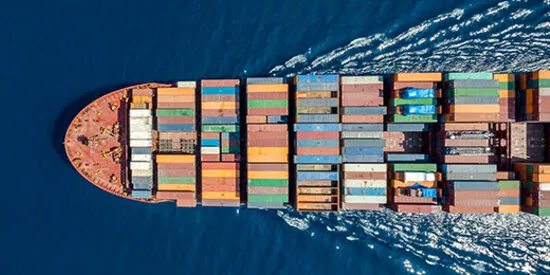
Towards a more responsible and sustainable approach to conduct Global transaction banking activities
Societe Generale recently launched a Sustainable GTB Framework to better support clients in their energy transition, particularly in assessing and monitoring the environmental and social impact of their day-to-day transactions. With ongoing regulation and evolving standards, what are the challenges companies are facing? What is their role in this energy transition? And what key actions should they take to accelerate their energy growth? In this podcast, Marie Gabrielle De Drouas (MGD), Head of ESG, Global Transaction Banking, sheds light on the issues for treasurers in terms of ESG and the challenges they face. Read the script of her interview with Eleanor Hill (EH), journalist from TMI, below.
EH, (TMI)
Welcome to TMI's Treasury Cast.
I'm Eleanor Hill, Editor of TMI, and Im delighted to be joined today by Marie-Gabrielle De Drouas (MGD), who is Head of ESG within Societe Generale's Global Transaction Banking Department. We are going to be talking all about sustainability and also an exciting new framework developed by the bank. But I don't want to give away too much upfront, so we will just tease you. Marie-Gabrielle, it's a real pleasure to have you. We are going to be talking about what most of the listeners already know is my favourite topic, so ESG. Maybe you could start with just an overview for those treasurers who are not familiar with ESG, not understanding why it is a topic of concern to treasurers.
Can you tell us a little bit about that and maybe briefly how they can play a role within their organisation to embrace ESG?
MGD, (Societe Generale)
I am happy to be with you. So treasurers should take ESG into account because it's a strategic topic, basically, for every corporate in every sector, whatever its size, whatever its geographical presence, as it impacts its position versus its peers, but also short term to medium term revenues, profitability, but it might also impact their license to operate at some point. Also because it became a board imperative, and once something is a board imperative, I think it's an imperative for everyone and obviously for treasurers as well. And what are the challenges and roles of treasurers in this regard?
I think first thing is versus the regulators. There's obviously an increasing regulatory requirements leading to a merge of financial and non financial ESG reporting. There's also a need for higher quality in terms of ESG data and higher frequency that we were not used to and treasurers were not used to. But also by integrating ESG in their investment decisions, in the financing of the transformation, by the way they allocate resources, the way they look at return on investment, and also by optimising the liquidity while increasing the impact that they might be having through it.
EH, (TMI)
Yes, there are so many different things that treasurers can do now. Banks and fintechs and vendors coming up with very interesting solutions around this as well. But you mentioned one of the key themes, Marie-Gabrielle, which is regulation. Obviously, there's a lot going on in this space with different standards coming out, etc. Some of them are very relevant for corporate treasurers. Some of them, they just need to know about in the bigger picture. What particular developments would you say should be top of mind around ESG regulation and standards for corporate treasurers specifically?
MGD, (Societe Generale)
Yes, you are right, because there are many of them. So let's focus on the most important ones. I would say the first one being, obviously, the reporting regulations. There's increasing regulatory requirements such as the Corporate Sustainability Reporting Directive, the EU Green Taxonomy that imposes to report on the percentage of your OpEx or CapEx that is aligned and eligible to the EU Taxonomy. But in addition to that and to stronger regulations in Europe, there is additional local regulations. There are additional local standards such as the ISSB. On top of reporting regulations, there ‘is also an important point on the responsibility that the corporates now have on their whole value chain. If you look at Europe, once again, there' is a regulation on sustainability diligence, the regulation on deforestation-free products for treasurers that are active in agriculture sector, for instance. This needs to be taken into account. But there is also an important point for treasurers is the regulations not only that apply to them as corporates, but that also applies to the banking partners and to their investors, because obviously they have the regulations. We've got ours. We have to report on a green asset ratio on many topics.
For that, we need very detailed and very reliable information from our corporate clients and corporate treasurers as well.
EH, (TMI)
Yes, and treasurers will find that they are increasingly asking for this information, and it is good to be aware of it. I think, it makes it a lot easier for people to understand it from both sides. You mentioned the presence of local standards, and we are aware of national regulations and standards building up, there is always an issue in terms of getting that global harmonization. When we look at ESG disclosures and reporting, that standardisation piece still seems to be a huge challenge. What do you see as the main obstacles to achieving this harmonisation and how can they potentially be overcome?
MGD, (Societe Generale)
You are, absolutely right. I participated last January to a roundtable and the theme was the Alphabet soup of the ESG requirements... Yes, the theme is really representative of what we're all facing.. I think the first obstacle that we need to overcome is data. I mentioned it previously, but it's true that on ESG, we need now to have higher quality of data. We need this data to be fully integrated in the reporting systems. We used to have some financial reporting systems, up to date, that enable to have very regular information, not designed to integrate ESG. So now, we need those data to be fully integrated into ESG. Second point would be just to understand throughout the multiplicity of requirements: what are the major ones? what are the ones which need to comply with? But also not forgetting all the voluntary commitments that the corporates might have taken, such as net zero commitments that may lead to additional requirements that should not be forgotten. The last one, is a huge challenge. The regulation was not originally designed for the bottom of the balance sheet.
We always have in mind M&A and investments, and the same applies to banking. We always talk about loans and bonds, and we forget transaction banking. It is a real tricky part for treasurers to know and understand how it applies to their scope of responsibility.
EH, (TMI)
To that end, I will introduce the project that I teased at the beginning of this podcast, which is Societe Generale’s Sustainable Global Transaction Banking Framework, which you have been working really hard on developing. Presumably, the challenges that we talked about were really at the heart of why you felt such a framework was needed. Can you tell us more about the framework and how it enhances transparency and credibility?
MGD, (Societe Generale)
We have been discussing for many years with many of our treasurers amongst our corporate clients, and most of them mentioned they were struggling, to see how the bottom of the balance sheet could help their company transition, which is a key issue in their day to day. They received various requirements from different banking partners, not all aligned, unfortunately. They mentioned a lack of market standards, there is an increasing scrutiny around ESG from civil society with a risk, probably of greenwashing, which is a major concern for them as well. One last and challenging point is the complicated impact to demonstrate when it comes to short-term financing and transaction banking. With all this in mind, Societe Generale deciced to increase its transparency. needed a clear definition of sustainable global transaction banking. Thatis how we came with this solution of defining a very clear framework that would state very clearly what are the activities that can be considered as green, as social, and how they apply to global transaction banking. May it be trade finance, may it be factoring, may it be working capital finance.
And we have been working on this global framework that really describes it and that focuses on increasing the transparency for our corporate clients, treasurers, and any counterparts that is interested in our approach.
EH, (TMI)
And what do you think the framework brings that's different or new? Could you also give some examples of how clients have been using it, as you say, you have had it in the pipeline for a couple of years now.
MGD, (Societe Generale)
It is new, and hopefully it will bring a lot more on the market. But let's not forget that it remains current. It remains current with Societe Generale’s strategy and with each market practice and market standard, such as the EU taxonomy, the Green Loan Principles, the Social Loan Principles. It was really at the backbone of our approach. But on top of that, as I mentioned before, we needed to adapt this to the specificities of global transaction banking, and that'is where it comes with a new angle. I am just taking examples, but for instance, we had to adapt it to short-term financing. We had to adapt it to uncommitted lines, which is not really covered actually by the market. We managed to integrate on trade, for instance, not only project financing and things really linked to the EPC contractors, but we managed to cover the whole value chain, even covering trade finance with companies that are probably a bit upper in the value chain, taking into account new counterparts, such as the beneficiary, the applicant as well, that are not necessarily counterparts usually covered by the existing frameworks on the market. An example is we have been recently working with a large corporate client that already had a green bond framework in place, but they took back a bit and was not necessarily up to date compared to market practice.
With our framework, we have been working for some months with this corporate client, trying to identify the common basis of what could be considered green by us, but also by them. We came up with a system where we had two types of activities, the one that could be automatically labelled as green because they were up to date and aligned with our requirements. But another part of activities that needed probably a bit more deep-down in-depth analysis before being considered as green. This really helped us to cover a bunch of different warranties, not having to look at each and every each guarantee independently but anticipating a bit the requirements. It was a huge gain of time, I think, for our corporate client to that sense.
EH, (TMI)
How do you think it's a great development, this framework? But there's always people, particularly around ESG, who have their concerns and you mentioned before greenwashing, etc. How important is it, Marie-Gabrielle, to have external reviews? I know that you used ISS Corporate conducting a review on the framework just to validate and enhance the credibility of this kind of framework, what difference does it make to have that external body come and say, yes, this is working well and this suits the needs?
MGD, (Societe Generale)
It was an imperative for us, to be honest. When it comes to market standards, it's recognized well over the markets, and there's no doubt in the reliability of this approach. But when it comes to individual frameworks, we really thought that it was important to have an external independent third party looking at it with their own methodology and confirming the reliability of our approach, confirming that it'is aligned to market standards, and confirming that it is up to date in terms of the requirements, and especially on the EU taxonomy. We know that, and we really appreciate the fact that ISS has recently updated its methodology and is able to pronounce itself in terms of alignment with the EU taxonomy screening criteria of our framework. We think that it leads to a highest transparency, and it is a very important point. While we discussed our client, it was a point of attention for them, and we are happy to be able to demonstrate the reliability of our approach.
EH, (TMI)
Yes, it just adds that extra gravitas, credibility, but also peace of mind for everyone involved. An excellent step to making sure that everyone feels right with this framework and the direction of it. But talking about the direction of things in the future, obviously, the framework will probably need to evolve. How do you see ESG standardisation going forward? What future developments, especially around transaction banking, do you predict and how might they potentially impact corporate treasurers?
MGD, (Societe Generale)
Yes, absolutely right. Around ESG, we always talk about the moving target. We are never there, basically. It's an always evolving environment, and we will need to take that into account. For instance, we are focusing now more on the climate objectives of the EU taxonomy, and we know we will need at some point to enlarge it to cover the other objectives of the EU taxonomy. But we also think that some standards will evolve in the market. For instance, the International Chamber of Commerce is currently working on a standard on sustainable trade and sustainable trade finance. We are very closely monitoring what will come out of this. We invite our corporate treasurers to participate also to this pilot phase to make sure that what comes out of the standards is rationally applicable, that it brings value both to the banks and the corporate treasurers. But we also see that we should be going beyond pure green and pure social labels, which is a good part, but it remains the top of the iceberg. We also need to see more globally how anything that is done by our corporates in terms of transitions can be valued and can be supported in a different way by banking partners.
We follow very closely all the work that is going on in terms of taxonomies around transition activities, and we think it'is a very important point.. We are also thinking of more disruptive offers to support our client in their transitions. One last point, probably, could also be having some verifiers such as ISS or external auditors being able to work with banking partners and with treasurers on a deal per deal basis, not only at a framework level, but looking at each transaction and confirming, for instance, the alignment of these transactions with the EU taxonomy, we think would be a major plus.
EH, (TMI)
I look forward to hearing more about the disruptive offers that you' have in mind. It is always good to hear about things that are switching the game up. One last word to our audience, Marie-Gabrielle, what advice would you give to our corporate treasurers, who are certainly concerned about these increasing complexities of ESG challenges?
MGD, (Societe Generale)
No wonder they're a bit scared, but I would say, pick your battles, first of all. Start very simple. Try to anticipate what is coming.
That's very important so that you are not always in a defensive way and surrounded by the wave that comes. So anticipate as much as you can and talk. Treasurers are at the driving seat of collaborations with any stakeholders within the company, but also with external stakeholders. And I think that they should be talking to their ESG teams and being working hand in hand with them. They should, of course, work hand in hand with their CFO, to make sure that the bottom and the top of the balance sheet are moving in the same direction. But they should also be working and discussing with their peers. I think ESG should not be a competitive issue. It should be something where we have a lot of transparency with peers. We are all struggling with the same challenges, and it is the same for banks. I really encourage them to talk to their peers, and last, to come to their banking partners.
We are here to help. We need them. We need to understand what the challenges are in order to be able to provide, as you mentioned, adapted solutions that may require a little bit of out of the box thinking. We are happy to discuss with them and see how we can help them meet the challenges that are coming.
EH, (TMI)
Excellent. Yes, absolutely. Working together is really the way for progress. Marie-Gabrielle, thanks so much for joining us today on this podcast and talking us through this really substantial development from the bank in terms of ESG within transaction banking. It's been a pleasure having you here. For anyone listening wanting to find out more, do head across to the TMI website where we have also published an article on this topic featuring Marie-Gabrielle. It outlines a little bit more about the framework that we have been discussing today. But for now, thank you all for listening. And thanks once again for joining us, Marie-Gabrielle.




